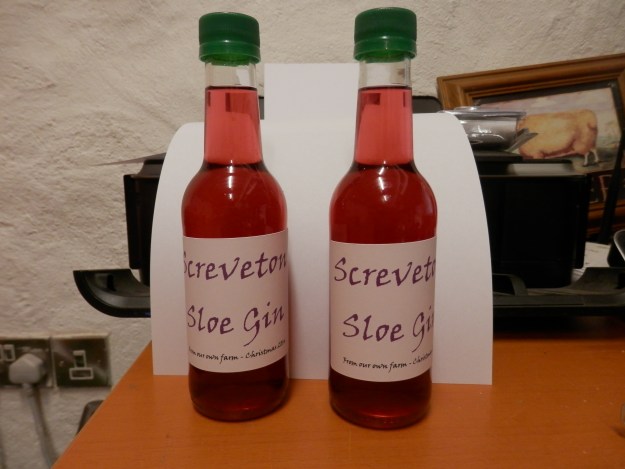Further to the last post I’m happy to report that I managed to find two bottles of Sloe Vodka left over from previous years – one is a delicate pink from last year and the other, from three years ago, has taken on the red/brown colour of old port. I don’t think it has matured in the bottle – just that the older sample was darker and less well filtered to start with.
I have also done four hours research (I use the term loosely – it was the internet) and I am now a sloe expert.
Strangely, when looking for words to describe my newly self-declared status, it was a bit of a struggle. There’s something immodest about calling yourself an expert (even in jest). The words that come to mind are mainly from other languages – fundi, guru and maven all spring to mind. I should probably reflect on this meaning that we Brits are a modest race, but I’m sure there are other, better qualified people to do this.
The problem is that fundi and maven aren’t widespread in England and to call your self a guru is to invite a measure of suspicion, as the word has a number of negative connotations (unless you move in circles that refer to “touching base”, “running it up the flagpole” and “singing from the same hymn sheet”.)
Talking of business cliches how about this – “allocating budget to a delivery structure”. It’s a lot of words that mean “do things” whilst pretending that we have (a) a budget and (b) a “delivery structure”. It has inspired me to start a list of such things.
So, here I am, an expert.

I now know that the best way to make sloe gin. You use cheap gin, or expensive gin. You add sloes that have been picked after the first frost, picked in late summer, frozen, pricked or bashed. Then you add no sugar, some sugar, half the sugar or lots of sugar – because you don’t need lots of sugar or can always add some later (in the form of sugar or syrup).
See – all you need to know about sloe gin – written by experts, people who have been doing it 50 years, people with chemistry degrees, winemakers and people who have just started making it but have read about it on the internet.
You now know as much as I do, but didn’t have to spend four hours doing it!
All you need to decide now is whether to prick the sloes with a thorn from the tree, a silver pin, an ordinary pin, a fork or a device made from cork and multiple pins.
Oh, and you need a position on osmosis.
Now you’ve read all that send me a fiver and I’ll send you a certificate to print out.
Or you can come down to the farm next September to attend our Sloe Gin workshop (yes, I’m serious – putting it together now).
Got to go now – sandwiches to make.
Will be back later.
